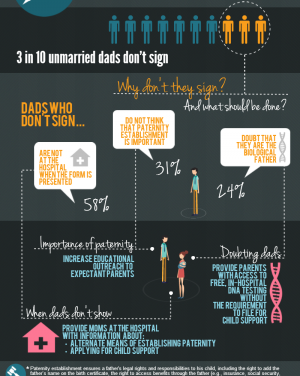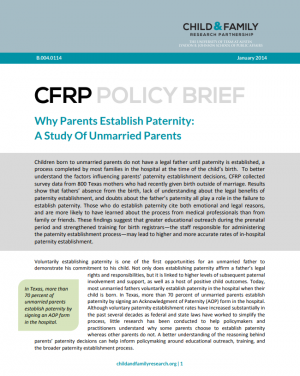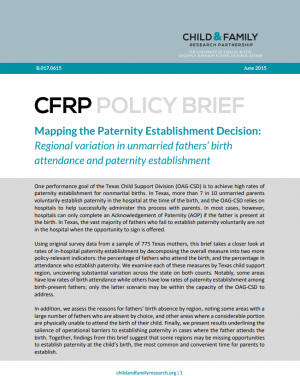A child born to unmarried parents does not have a legal father until both parents establish paternity. Without legally establishing paternity, unmarried fathers have no rights or responsibilities to their children, which impacts the benefits and protections fathers can receive.
For unmarried parents, research links paternity establishment in the hospital to higher levels of subsequent father involvement and support, as well as numerous positive child outcomes. Below are resources to help organizations and parents understand the importance of paternity establishment. Learn more about paternity establishment in Texas or visit the Office of the Attorney General’s Child Support Division website.
Resources

Dads on the Dotted Line: Why Unmarried Dads Don’t Establish Paternity
The signing of a voluntary acknowledgment of paternity is an unmarried father’s first legal act of fatherhood; without it, he has none of the legal rights or responsibilities of parenthood. Paternity establishment is also a milestone opportunity for an unmarried father to demonstrate his commitment to his child. This infographic explains why some unmarried fathers do not sign the acknowledgment of paternity form, and suggests actions organizations can take to address each reason fathers do not establish paternity.
5 Things You Should Know about Nonmarital Births and Paternity Establishment
This one pager provides a primer on nonmarital births, highlighting some of the essential trends and legal considerations relevant to births that occur outside of marriage.

Why Parents Establish Paternity: A Study of Unmarried Parents
Survey data from 800 Texas mothers who had recently given birth outside of marriage show that fathers’ absence from the birth, lack of understanding about the legal benefits of paternity establishment, and doubts about the father’s paternity all play a role in the failure to establish paternity. Greater educational outreach during the prenatal period and strengthened training for birth registrars may lead to higher and more accurate rates of in-hospital paternity establishment.

Mapping the Paternity Establishment Decision: Regional Variation in Unmarried Fathers
Using survey data from a sample of unmarried Texas mothers, CFRP’s study found that even when fathers attend the birth of their child, the most common reasons for not establishing paternity are operational—from missing the moment the Acknowledgement of Paternity (AOP) was offered, to not having proper identification, to not being given (or not remembering) the chance to sign. These findings suggest that programs can address gaps in paternity establishment by targeting their efforts towards regions with low rates of AOP-signing among fathers who are at the hospital.


